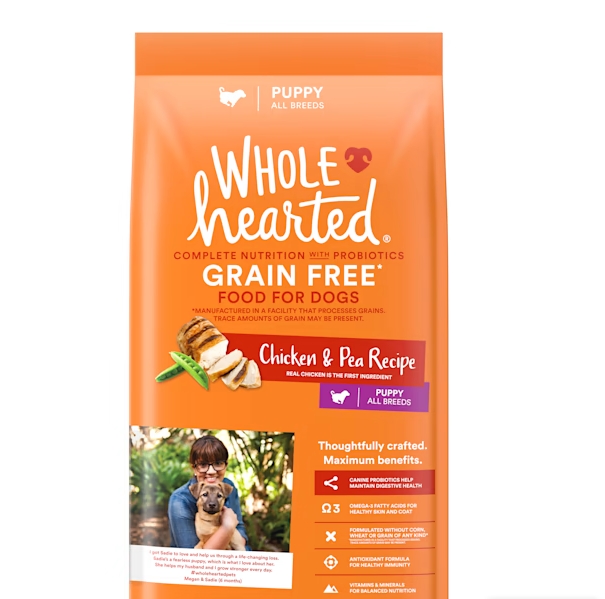
WholeHearted Grain Free Chicken and Pea Recipe Dry Puppy Food, 25 lbs.
- The WholeHearted Grain Free Chicken and Pea Recipe Dry Puppy Food nourishes your young, growing pup with high-quality ingredients. DHA helps support your clever puppy”s brain development while Omega-3 fatty acids help keep their skin and coat supple and shiny.
- – Grain Free, Puppy, Chicken and Pea Recipe Dry Dog Food from WholeHearted
- – Real chicken is the first ingredient
- – Canine probiotics help maintain digestive health
- – Omega-3 fatty acids for healthy skin and coat
- – No corn, wheat, or grains of any kind
- – Antioxidant formula for healthy immunity (guaranteed levels of Vitamin E, Selenium, and Zinc)
- – Vitamins and minerals for balanced nutrition
$49.99
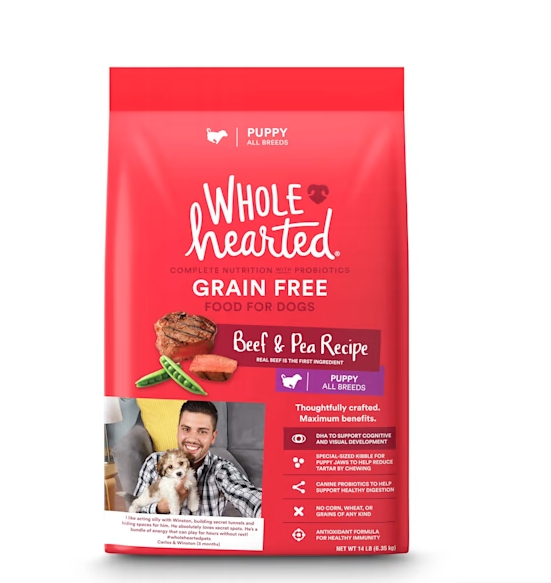
WholeHearted Grain Free All Breed Beef & Pea Recipe Dry Puppy Food, 14 lbs.
- The WholeHearted Grain Free All Breed Beef & Pea Recipe Dry Puppy Food benefits your playful puppy’s growing needs as it gets their tail wagging for mealtime with a thoughtfully crafted recipe that supports your desire to feed them right from the very start. DHA as well as other key nutrients in this yummy recipe supports their cognitive, visual development and more while a hearty blend of beef and pea delights your four-legged meat-lover.
- – Grain Free All Breed Beef & Pea Recipe Dry Puppy Food from WholeHearted
- – Real beef is the first ingredient
- – Features DHA to support cognitive and visual development
- – Special-sized kibble for puppy jaws to help reduce tartar by chewing
- – Canine probiotics to help maintain digestive health
- – No corn, wheat or grains of any kind
- – Antioxidant formula for healthy immunity
$34.99
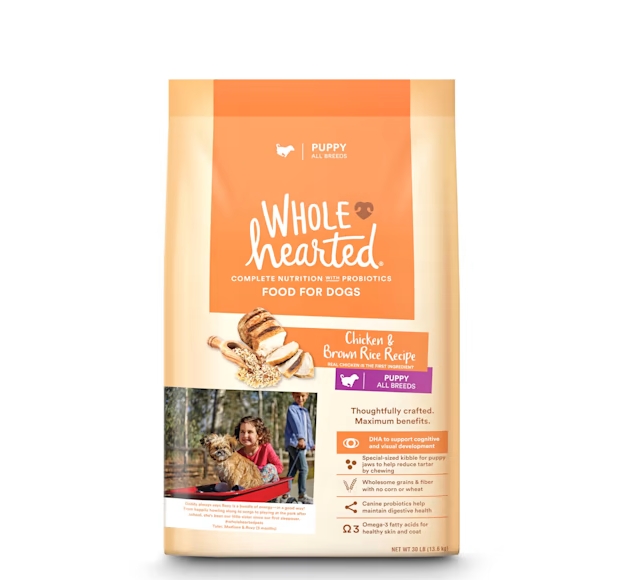
WholeHearted All Breed Chicken and Brown Rice Recipe Dry Puppy Food, 30 lbs.
- The WholeHearted All Breed Chicken and Brown Rice Recipe Dry Puppy Food serves up a bowlful of nutrition starring poultry and delicious brown rice, a nutritious source of protein, vitamins and minerals. They’ll look forward to every scrumptious bite while you’ll love that this recipe boasts DHA to support their cognitive and visual development and probiotics to help maintain their digestive health.
- – All Breed Chicken and Brown Rice Recipe Dry Puppy Food from WholeHearted
- – Real chicken is the first ingredient
- – Features DHA to support cognitive and visual development
- – Special-sized kibble for puppy jaws to help reduce tartar by chewing
- – Wholesome grain & fiber with no corn or wheat
- – Canine probiotics to help maintain digestive health
- – Omega-3 fatty acids for healthy skin and coat
$52.99
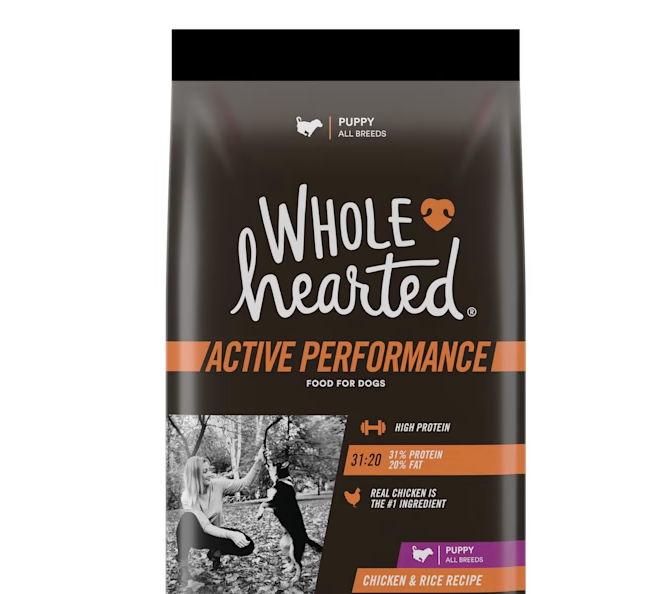
WholeHearted Active Performance High-Protein Chicken & Rice Recipe Dry Puppy Food, 30 lbs.
- The Wholehearted Active Performance High-Protein Chicken & Rice Recipe Dry Puppy Food powers up your athletic pup’s diet. From beachside runs to mountainside trails, they’ll be ready to take on every excursion. This formula features 30% protein and 20% fat to support lean muscle and sustained energy. Before and after your adventure-packed days, their bowl will be filled with balanced nutrition they need for the active life that the two of you lead.
- – Active Performance High-Protein Chicken & Rice Recipe Dry Puppy Food from WholeHearted
- – Real chicken is the #1 ingredient
- – 30% protein and 20% fat to support lean muscle and sustained energy
- – 89% of protein from animal sources to help maintain strong muscles
- – Glucosamine and chondroitin to help support joint health
- – Canine probiotics help maintain digestive health while wholesome rice provides a highly digestible energy source
- – Formulated without corn or wheat
$54.99
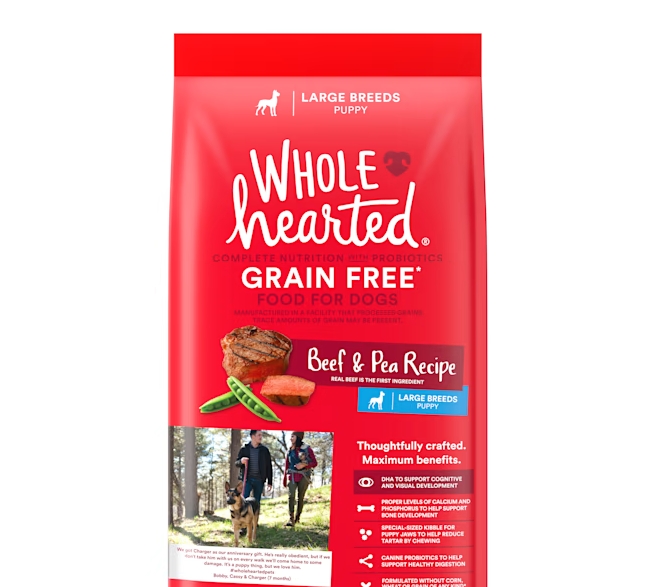
WholeHearted Large Breed Beef & Pea Recipe Dry Puppy Food, 25 lbs.
- The WholeHearted Large Breed Beef & Pea Recipe Dry Puppy Food feeds their appetite for rich, meaty flavors as well as their need for complete nutrition with a bowlful of nutrients made to help you confidently cater to your precious pup’s development. As they grow, this tasty recipe will help maintain their digestive health and immunity with canine probiotics and an antioxidant formula, while DHA helps support their cognitive and visual development.
- – Large Breed Beef & Pea Recipe Dry Puppy Food from WholeHearted
- – Real beef is the first ingredient
- – Features DHA to support cognitive and visual development
- – Special-sized kibble for puppy jaws to help reduce tartar by chewing
- – Canine probiotics to help maintain digestive health
- – No corn, wheat or grains of any kind
- – Antioxidant formula for healthy immunity
$49.99
Finding the Perfect Balance Between Quality, Nutrition, and Value for Your Growing Pup
As I sit here watching my little golden retriever puppy, Max, happily munching away at his kibble, I can’t help but reflect on the journey that led me to choosing Wholehearted Puppy Food. Those first days of bringing home a new puppy were both exhilarating and overwhelming. Between potty training mishaps and sleepless nights, the last thing I wanted to worry about was whether I was feeding him the right food. Yet that decision felt monumental – after all, what we feed our puppies directly impacts their growth, development, and long-term health.
Three months ago, after hours of research and several well-meaning but contradictory recommendations from friends, I finally settled on Wholehearted. The change in Max has been remarkable – his coat is shinier, his energy levels are perfect (well, as “perfect” as puppy energy can be!), and our vet has nothing but praise for his development. This experience prompted me to share my deep dive into Wholehearted Puppy Food with other new puppy parents who might be feeling as lost as I once did.
Understanding What’s Actually in Wholehearted Puppy Food
When I first started researching puppy foods, the ingredient lists felt like reading a foreign language. What’s a “by-product meal”? Is “chicken meal” different from actual chicken? Does my puppy need grains or not? The confusion was real.
Wholehearted impressed me right away with their transparency. Their puppy formulas start with real meat as the first ingredient – not meat by-products or mysterious “meal” concoctions. Depending on the formula you choose, you’ll see chicken, lamb, salmon, or another quality protein source listed first. This isn’t just marketing fluff; it genuinely matters for your puppy’s muscle development.
Looking deeper into the ingredients, I noticed several things that set Wholehearted apart:
- Real, identifiable proteins make up the bulk of the food
- Healthy fats from sources like salmon oil and flaxseed to support brain development and coat health
- Fruits and vegetables that provide natural sources of vitamins and antioxidants
- Added probiotics to support digestive health (something I particularly appreciated when Max had tummy troubles after too many training treats)
- No artificial colors, flavors, or preservatives
What I didn’t see was just as important: no corn, wheat, or soy fillers that can trigger allergies in some puppies. Instead, they use more digestible carbohydrate sources like sweet potatoes or brown rice (depending on whether you choose grain-free or grain-inclusive varieties).
The grain-free debate was something I wrestled with considerably. Recent studies have raised questions about grain-free diets and heart health in dogs, which initially made me nervous. After consulting with our veterinarian, I learned that Wholehearted offers both grain-free and grain-inclusive options, and their grain-free formulas include taurine supplements to support heart health. We ultimately chose their grain-inclusive chicken and brown rice formula for Max, but I appreciate having options as he grows.
The Nutritional Powerhouse Behind Your Puppy’s Growth
Puppyhood is arguably the most nutritionally demanding period in a dog’s life. The food you provide during these formative months lays the foundation for a lifetime of health. This is where Wholehearted truly shines.
When I examined the nutritional profile, I was pleased to find that Wholehearted Puppy Food maintains a protein content between 26-30% depending on the formula. This exceeds AAFCO (Association of American Feed Control Officials) standards for growing puppies and provides the amino acids essential for muscle development.
What really caught my attention was the balanced calcium-to-phosphorus ratio – a crucial consideration especially for large-breed puppies like Max. Too much calcium can cause skeletal abnormalities in large breeds, something I wasn’t aware of until my vet pointed it out. Wholehearted’s large breed puppy formula carefully calibrates these minerals to promote healthy, controlled growth rather than the rapid growth that can cause joint problems later.
The inclusion of DHA (docosahexaenoic acid) from fish oil was another selling point. This omega-3 fatty acid is essential for brain and vision development in puppies. I like to think this is why Max learned “sit” and “down” so quickly, though his selective hearing when squirrels are around suggests otherwise!
For puppies with sensitive stomachs (a common issue in many breeds), the added probiotics in Wholehearted formulas help support healthy digestion. I noticed this benefit firsthand when we transitioned Max from the breeder’s food to Wholehearted – his previously loose stools firmed up within days, and the occasional gas that had us opening windows disappeared completely.
Breed-Specific Considerations: Is Wholehearted Right for YOUR Puppy?
Not all puppies have the same nutritional needs, a fact that became crystal clear to me when comparing notes with my friend who has a Yorkie puppy while I raise my golden retriever. The caloric needs, growth rates, and potential health concerns vary dramatically between breeds.
Wholehearted addresses these differences with specialized formulas. Their large breed puppy food contains glucosamine and chondroitin for joint support – crucial for breeds predisposed to hip dysplasia. The small breed formula has smaller kibble pieces (no choking hazards) and higher calorie density to fuel those surprisingly energetic little bodies.
When I was deciding between formulas, I considered Max’s projected adult weight (around 70 pounds) and selected the large breed option. The kibble size is perfect – large enough that he can’t inhale it without chewing (something he would absolutely do if given the chance) but not so large that it’s difficult for him to eat.
For those with toy or small breed puppies, the small bite formulas provide concentrated nutrition in appropriately sized pieces. Medium-sized breeds often do well on the standard puppy formula, though if they’re particularly active, the higher calorie content of the small breed formula might be beneficial.
Navigating Potential Allergies and Sensitivities
One aspect of puppy parenting I hadn’t anticipated was dealing with food sensitivities. While Max fortunately hasn’t shown any allergic reactions, I’ve become somewhat of an unofficial advisor to my puppy playgroup friends whose pups have had issues.
Wholehearted offers several protein options beyond the standard chicken, including salmon, lamb, and beef varieties. This variety is invaluable for puppies showing signs of food allergies, as protein source is often the culprit. One friend’s Lab was constantly scratching and had recurring ear infections until she switched from a chicken-based food to Wholehearted’s salmon recipe.
The limited ingredient diet options are particularly useful for puppies with multiple sensitivities. These formulas narrow down potential allergens while still providing complete nutrition. They cost a bit more, but considering the alternative (constant vet visits and medications for allergy symptoms), they can actually be more economical in the long run.
If you’re uncertain whether your puppy has food sensitivities, watch for these warning signs:
- Excessive scratching or licking
- Recurrent ear infections
- Gastrointestinal upset (vomiting or diarrhea)
- Red, irritated skin
- Constant paw chewing
Any of these symptoms warrant a discussion with your veterinarian, who might recommend trying a different protein source like those offered in Wholehearted’s various formulas.
The Price Factor: Value vs. Cost in Puppy Nutrition
Let’s talk about something that matters to most of us: price. Premium dog food isn’t cheap, and Wholehearted definitely positions itself in the premium category. When I first calculated what it would cost to feed Max this brand throughout his puppyhood, I had a moment of sticker shock. Was it really worth paying nearly double what some grocery store brands charge?
After three months of feeding Wholehearted, my answer is an unequivocal yes. Here’s why:
First, the nutrient density means you feed less. Those bargain brands often contain fillers that pass right through your puppy without being absorbed, meaning you need to feed more to provide adequate nutrition. With Wholehearted, I’m actually using less food than the package recommends because Max maintains perfect weight on slightly reduced portions.
Second, I’ve noticed significantly less waste to clean up in the yard. The higher digestibility means more nutrients are absorbed and less passes through as waste. This might seem like a small thing, but anyone who’s spent their Saturday morning scooping the yard will appreciate the difference!
Third, and perhaps most importantly, I view quality nutrition as preventative healthcare. The money I spend on premium food now potentially saves on vet bills later. Conditions like obesity, dental disease, and allergies often stem from poor nutrition, and treating these issues costs far more than preventing them through proper diet.
Wholehearted is positioned at a sweet spot in the market – more affordable than ultra-premium brands like Orijen or Acana, but offering many of the same quality ingredients and nutritional benefits. It’s exclusively sold at Petco, which regularly offers sales and has a rewards program that helps offset the cost.
Transitioning Your Puppy to Wholehearted: A Step-by-Step Guide
When I decided to switch Max to Wholehearted, I was nervous about causing digestive upset. Puppies have sensitive tummies, and abrupt food changes can lead to diarrhea (not fun for anyone involved). Here’s the gradual transition method that worked perfectly for us:
Days 1-2: 75% old food, 25% Wholehearted
Days 3-4: 50% old food, 50% Wholehearted
Days 5-6: 25% old food, 75% Wholehearted
Day 7 onward: 100% Wholehearted
This slow transition allowed Max’s digestive system to adjust gradually. I monitored his stools closely during the transition (another glamorous aspect of puppy parenthood!) and was pleased to see they remained normal throughout.
If your puppy shows any signs of digestive upset during transition—such as loose stools, gas, or decreased appetite—simply slow down the process. Some particularly sensitive puppies might need 10-14 days to fully transition.
One tip I found helpful was to slightly moisten the Wholehearted kibble with warm water during the transition. This releases more aroma, making it more appealing, and also creates a texture that blends better with the previous food.
Feeding Schedules and Portion Control for Optimal Growth
Determining how much to feed a growing puppy feels like hitting a moving target. They need enough calories to fuel growth but not so many that they grow too quickly or become overweight. Wholehearted provides clear feeding guidelines on their packaging, but I’ve found these should be viewed as starting points rather than rigid rules.
For Max, we settled on a three-meals-per-day schedule until he was 4 months old, then transitioned to twice daily feeding. The package recommended 3 cups daily for his weight, but after monitoring his body condition (you should be able to feel but not see ribs), we adjusted to 2¾ cups daily divided between his meals.
I cannot overemphasize the importance of measuring your puppy’s food rather than free-feeding or eyeballing portions. An extra quarter cup daily might seem insignificant but can contribute to unhealthy weight gain over time. Maintaining a healthy weight during puppyhood is one of the most important factors in preventing joint problems and other health issues as your dog ages.
If your puppy seems constantly hungry despite receiving the recommended amount (a situation I know all too well with my perpetually food-motivated retriever), try these strategies instead of increasing portions:
- Use some of their daily kibble allowance as training treats
- Add low-calorie vegetables like green beans to their meals for extra volume
- Use puzzle feeders to slow down consumption and increase satisfaction
- Ensure they’re getting adequate mental and physical exercise, as boredom often masquerades as hunger
Storage Tips to Maintain Freshness and Nutritional Value
One aspect of dog food that doesn’t get enough attention is proper storage. Wholehearted, like most premium foods, doesn’t contain artificial preservatives, which means proper storage is crucial for maintaining freshness and nutritional value.
When I bring home a new bag of Wholehearted, I immediately transfer it to an airtight container rather than just rolling down the bag. Exposure to air accelerates nutrient degradation and can lead to rancidity of the fats in the food. The exception is if you purchase the largest bag size – in that case, I recommend keeping the food in its original bag (which has a protective liner) and placing the entire bag in a storage container.
I also store Max’s food in a cool, dry place away from direct sunlight. Heat and humidity can degrade nutrients and create conditions where mold could potentially grow. This is especially important if you live in a warm, humid climate.
Another tip I’ve found helpful is to write the date of purchase on the bag or container. Even properly stored dry dog food begins losing nutritional value after about 6 weeks once opened. For a medium to large breed puppy going through food quickly, this isn’t usually an issue, but for smaller puppies consuming less food, it’s worth considering purchasing smaller bags more frequently.
Real World Reviews: What Other Puppy Parents Are Saying
Beyond my personal experience with Max, I wanted to understand how Wholehearted was working for other puppies. I spent hours reading reviews and talking to fellow puppy owners at our local dog park to get a broader perspective.
The consensus has been overwhelmingly positive, with a few consistent themes emerging:
Digestive improvements are frequently mentioned, with many owners reporting fewer instances of upset stomach and firmer stools after switching to Wholehearted. For puppies with sensitive digestion, this benefit alone often justifies the premium price.
Coat quality improvements are another commonly cited benefit. Several owners of long-haired breeds like Shih Tzus and Cocker Spaniels noted shinier, less tangled coats after a few weeks on Wholehearted formulas, likely due to the omega fatty acids.
Energy levels are reported as “appropriate” – meaning puppies have plenty of energy for play and training without becoming hyperactive, as can happen with foods containing lower-quality ingredients or artificial additives.
The few criticisms I encountered centered mostly around price (though most acknowledged the value proposition) and occasional pickiness from some puppies, particularly when transitioning from foods with artificial flavor enhancers. This selective eating usually resolved within a week as puppies adjusted to the natural flavors.
I was particularly impressed by a conversation with the owner of a 13-week-old Bernese Mountain Dog puppy who had tried three different premium brands before finding success with Wholehearted’s large breed formula. Her puppy had struggled with loose stools and inconsistent appetite until the switch, highlighting how individual puppies can respond differently to various formulations.
Safety Record and Manufacturing Practices
In my research, the safety record of any food I feed my puppy is non-negotiable. Recalls happen across the pet food industry, but their frequency and handling tell you a lot about a company’s commitment to quality.
Wholehearted has maintained an impressive safety record since its launch. As of my writing this article, the brand has not experienced any significant recalls – a rarity in the pet food industry and a testament to their quality control measures.
The food is manufactured in the USA, which provides an additional layer of quality assurance given the stricter regulatory environment compared to some overseas production facilities. While individual ingredients may be sourced globally (a common practice across the industry), the final production occurs domestically under stringent quality controls.
I was pleased to discover that Wholehearted conducts both pre-production and post-production testing of their formulas. This dual testing approach helps ensure that ingredients meet specifications before manufacturing and that the finished product meets nutritional guidelines.
Their facilities use HACCP (Hazard Analysis Critical Control Points) protocols – the same food safety system used in human food production. This systematic preventive approach addresses biological, chemical, and physical hazards in production processes.
Where to Buy and What to Expect: The Purchasing Experience
Wholehearted is Petco’s in-house premium brand, which means it’s exclusively available through Petco stores and their online platform. Initially, I viewed this limited availability as a potential downside, but it’s actually proven convenient for several reasons.
Petco regularly offers promotions on Wholehearted products, especially through their Vital Care program which provides discounts on nutrition, grooming, and veterinary services for a small monthly fee. For a puppy like Max who will be on puppy food for a full year, these savings add up substantially.
The Petco app allows me to easily reorder Max’s food and have it delivered, often with free shipping. For busy puppy parents, this convenience factor shouldn’t be underestimated – one less errand to run while juggling training, socialization, and all the other aspects of raising a puppy.
In-store purchases come with the added benefit of knowledgeable staff who can answer questions about the different formulas and help guide your selection based on your puppy’s specific needs. I’ve had several helpful conversations with Petco nutritional advisors about adjusting Max’s portions as he grows.
One unexpected benefit of the Petco exclusivity is consistency in storage and handling. Because they specialize in pet products, there’s less chance of the food sitting in improper conditions or expiring on shelves, issues that can sometimes occur in general retailers where pet food is a secondary category.
Comparing Wholehearted to Other Premium Puppy Foods
When I first started researching puppy foods, the options seemed endless. How does Wholehearted truly compare to other premium brands like Blue Buffalo, Royal Canin, or Taste of the Wild?
In terms of ingredients, Wholehearted holds its own against competitors that often cost significantly more. The use of real meat as the first ingredient, inclusion of fruits and vegetables, and absence of artificial additives aligns with what you’d expect from premium nutrition.
Where Wholehearted particularly excels is in offering specialized formulas at a more accessible price point than many competitors. Their large breed puppy formula, for instance, compares favorably to Royal Canin’s large breed puppy food in terms of nutritional profile but typically costs 15-20% less.
When compared to Blue Buffalo’s puppy formulas, Wholehearted offers similar quality ingredients and nutritional benefits with slightly less marketing hype (and corresponding price markup). Both brands offer excellent nutrition, but the value proposition tips in Wholehearted’s favor.
Against grain-free options like Taste of the Wild puppy formulas, Wholehearted offers comparable quality while providing the choice between grain-free and grain-inclusive recipes – an option increasingly recommended by veterinarians as more research emerges about grain-free diets.
One area where some competitors edge ahead is in offering breed-specific formulations. While Wholehearted divides its puppy formulas into small, medium, and large breed categories, brands like Royal Canin offer highly specialized formulas for specific breeds. However, most veterinary nutritionists agree that such hyper-specialized formulations offer marginal benefits for most puppies.
Making the Transition to Adult Food: Planning Ahead
Although Max still has several months of puppyhood ahead of him, I’m already researching the transition to adult food. Wholehearted makes this transition particularly seamless by offering adult formulations that mirror their puppy counterparts.
The recommended timing for switching from puppy to adult food varies by breed size:
- Small breeds (under 20 lbs): Around 9-12 months
- Medium breeds (20-50 lbs): Around 12 months
- Large breeds (50-100 lbs): Around 12-18 months
- Giant breeds (over 100 lbs): Around 18-24 months
Since Max falls into the large breed category, I’ll be continuing his puppy formula until he’s at least 12 months old. The extended puppy phase for larger breeds helps ensure proper joint and bone development by providing the appropriate calcium-to-phosphorus ratio for a longer period.
When the time comes, I plan to transition him to Wholehearted’s adult large breed formula using the same gradual approach we used when introducing the puppy food. This consistency in ingredients and formulation should make for a smooth transition with minimal digestive upset.
One advantage of staying with the same brand for both puppy and adult food is nutritional continuity. Dramatic changes in protein sources or other key ingredients can sometimes trigger sensitivities in dogs with more delicate digestive systems.
Final Thoughts: Is Wholehearted Puppy Food Right for Your Fur Baby?
After three months of feeding Max Wholehearted Large Breed Puppy Food, participating in countless discussions with other puppy parents, and deep-diving into the nutritional science, I feel confident recommending this brand to fellow puppy owners.
Is it the absolute pinnacle of canine nutrition? Perhaps not – there are more expensive brands with even more exotic ingredients or specialized formulations. But Wholehearted occupies that sweet spot where quality nutrition meets reasonable pricing, making it accessible to more puppies.
For most puppy parents, the decision ultimately comes down to three factors: quality, results, and budget. Wholehearted scores impressively on all three measures. The quality of ingredients meets or exceeds what you’d expect from a premium brand. The results – at least in Max’s case and those of many puppies I’ve encountered – speak for themselves in terms of growth, coat condition, and overall health. And the budget consideration is where Wholehearted really distinguishes itself from competitors offering similar quality at higher price points.
The food you choose for your puppy is one of the most important health decisions you’ll make on their behalf. It’s worth taking the time to research options, potentially trying different formulas, and observing how your individual puppy responds. What works beautifully for one puppy might not be ideal for another, which is why Wholehearted’s variety of formulations is particularly valuable.
As I watch Max snoozing peacefully after his evening meal, growing stronger and healthier each day, I’m reassured that our choice of Wholehearted was the right one for his specific needs. Whether it’s right for your puppy depends on their individual requirements, your budget, and your nutritional priorities – but it certainly deserves a spot on your shortlist of considerations.
Remember, whichever food you choose, the greatest ingredient in your puppy’s well-being is the love and care you provide every day. The hours spent researching nutrition are just one manifestation of the commitment you’ve made to giving your new family member the best possible start in life.


